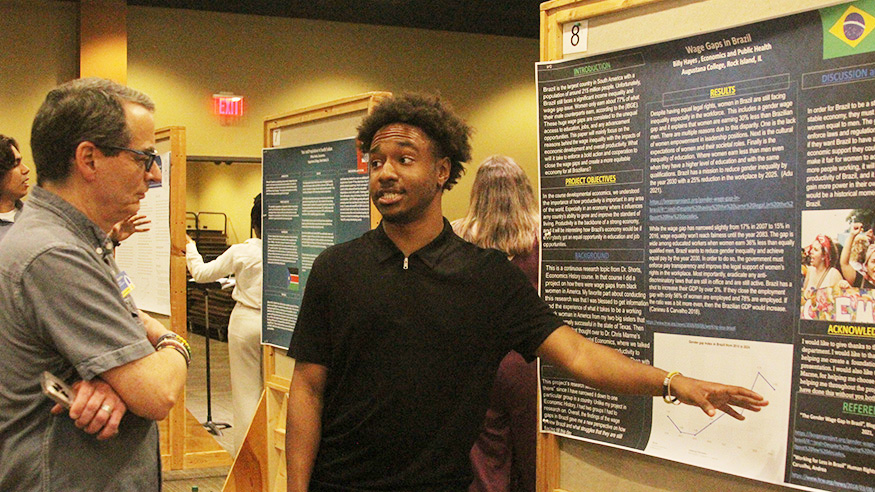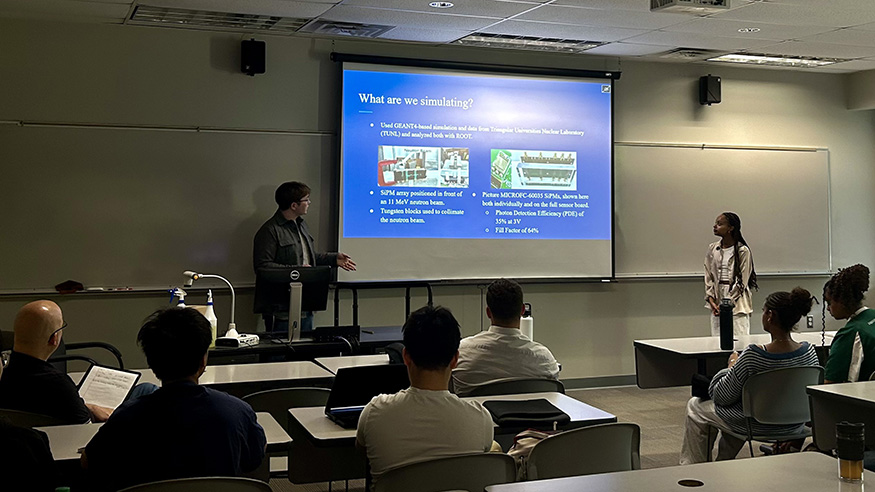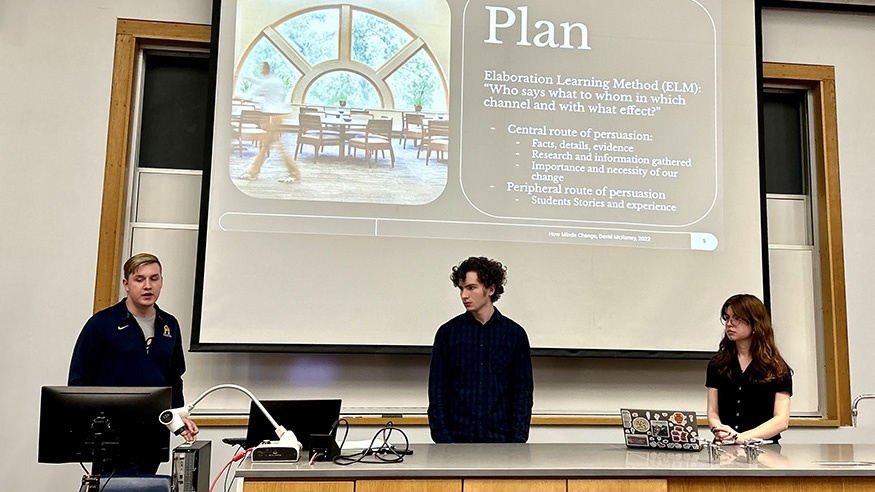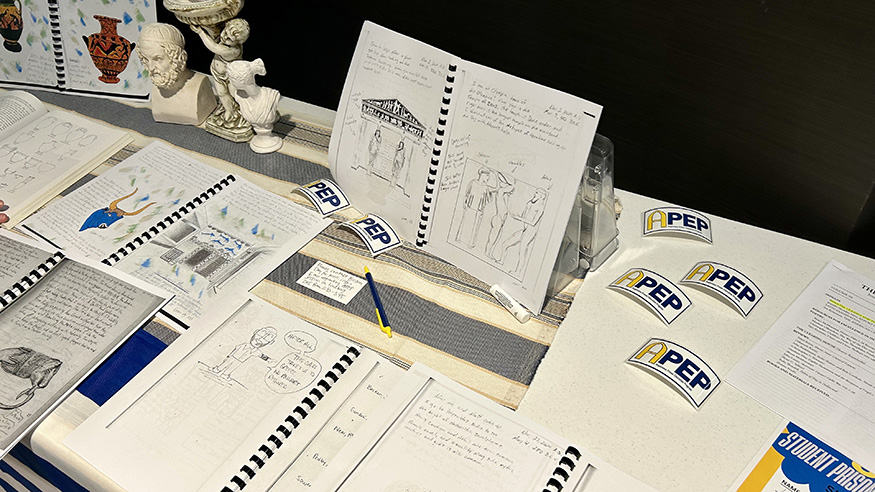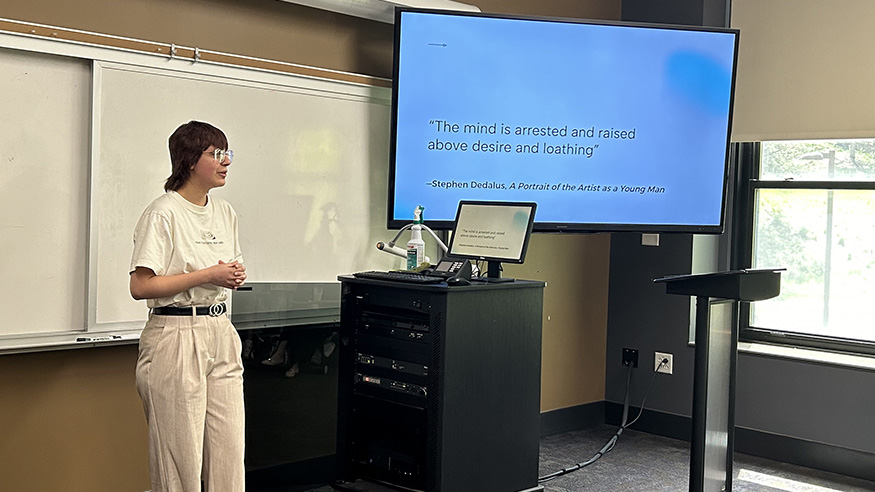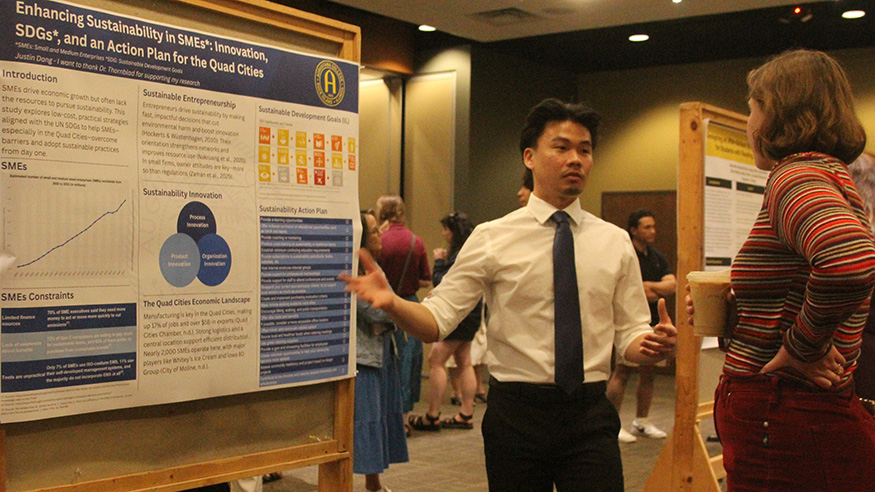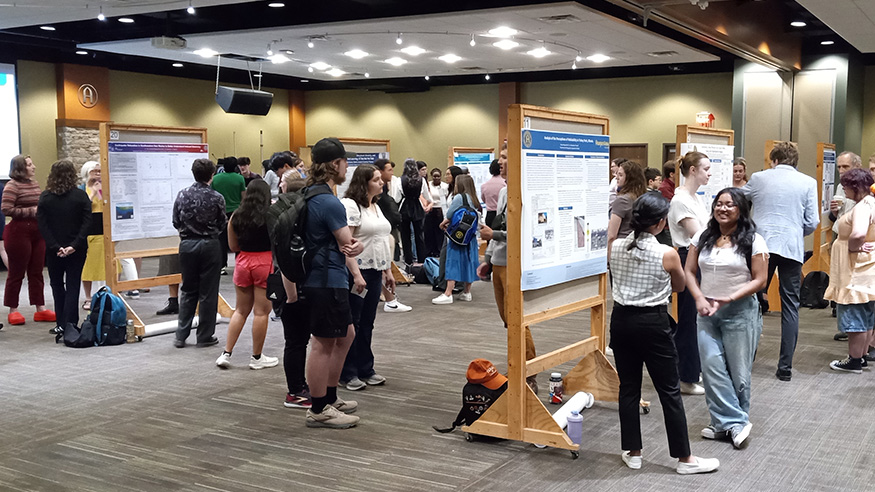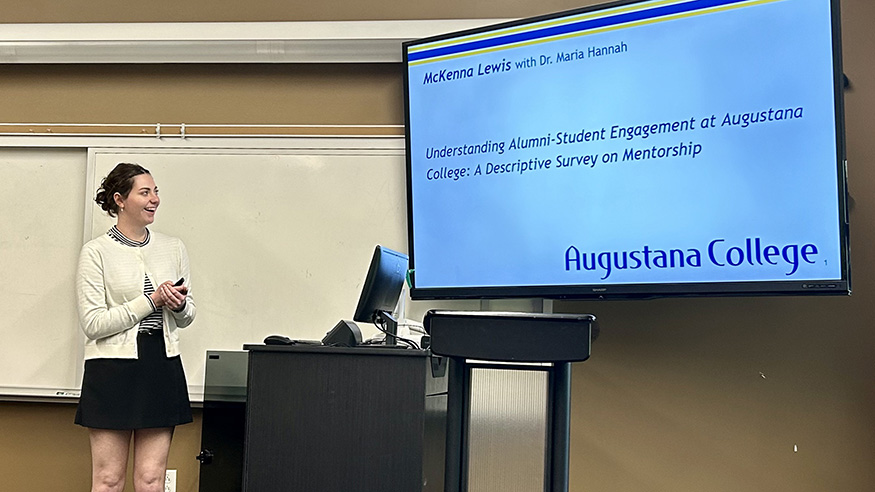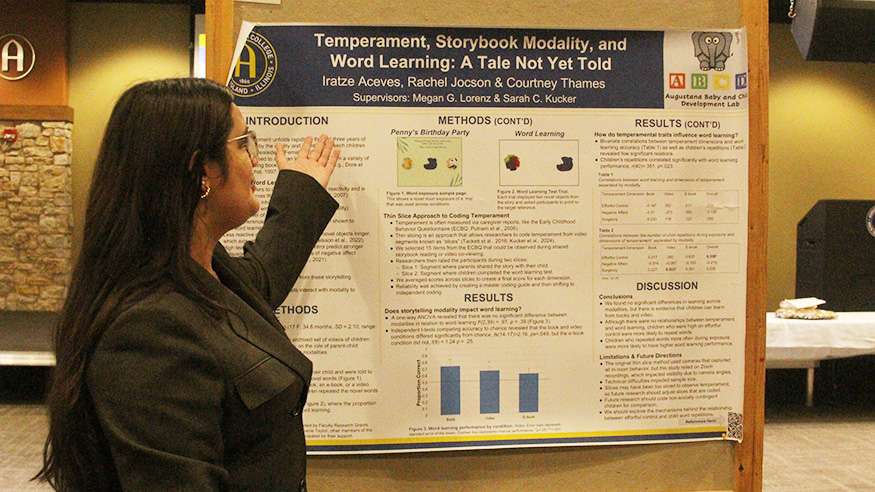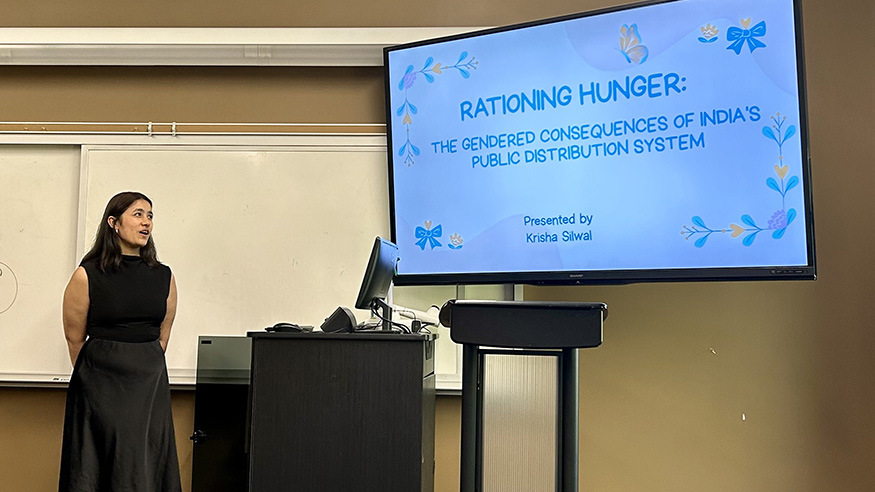Celebration of Learning 2025 shares interdisciplinary insights
The annual Celebration of Learning showcases work by students, faculty and staff at Augustana.
This year's celebration on May 7 included poster presentations, interactive sessions, an art show, panel presentations and special events, including the four below:
Assessing maternal and infant health in the Quad Cities
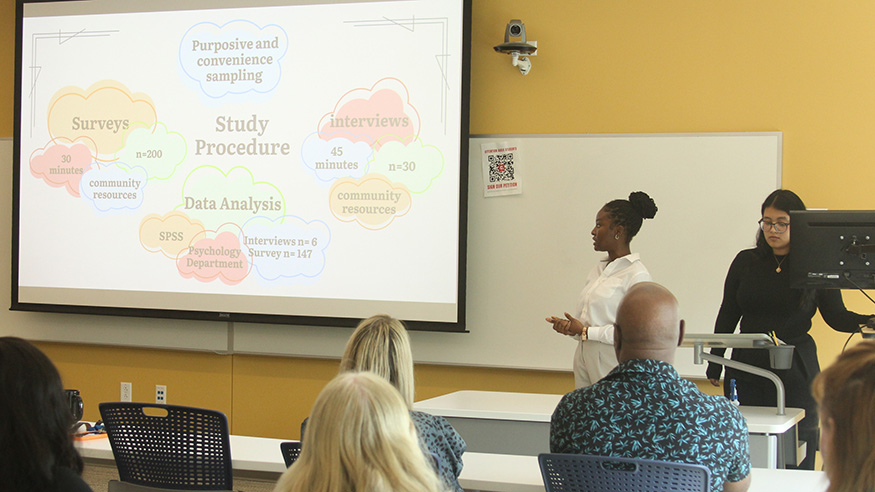
“Socioeconomic Influences on Maternal and Infant Health: Insights from Lived Experiences in the Quad Cities”
Presented by Selgie Okine '25, biology, and Americus Mahatshahi '24, pre-medicine and anthropology
Selgie Okine ’25, a biology major from Ghana, and Americus Mahatshahi ’24, a pre-medicine and anthropology graduate from Nepal, presented progress on a multi-year maternal health research project led by Augustana’s Center for the Advancement of Community Health and Wellness (CACHW) and advised by Dr. Kimberly Murphy and Peyton Heisch '23. The project seeks to understand how socioeconomic conditions affect maternal health and, ultimately, infant health in the Quad Cities.
Project partners include the Healthy Pregnancy Coalition and the Healthy Outcomes Planning Task Force on Low Birth Weight. The researchers worked with Augustana’s Institutional Review Board and health coalitions in New York, Florida and Wisconsin to determine best practices for collecting and assessing data.
While the results of the research aren’t expected to be released until next year, the presenters shared early findings from their current sample size of 147 survey responses and six in-depth interviews.
Factoring in socioeconomic data, initial findings suggest mothers with higher education levels were more likely to receive regular postpartum care. Survey findings also showed a discrepancy in maternal and infant care access between Black and white mothers, with 18.7% of Black mothers rating such care as “poor” (compared to 2.5% of white mothers).
Some early takeaways: Quad Cities mothers want stronger connections between medical providers and doulas, and better awareness of educational resources, such as breastfeeding and parenting classes. Oftentimes parents look to Facebook or other internet platforms for information; although community resources exist, they’re often poorly promoted.
More information on research results will be shared by CACHW in spring 2026.
What did your toys teach you?
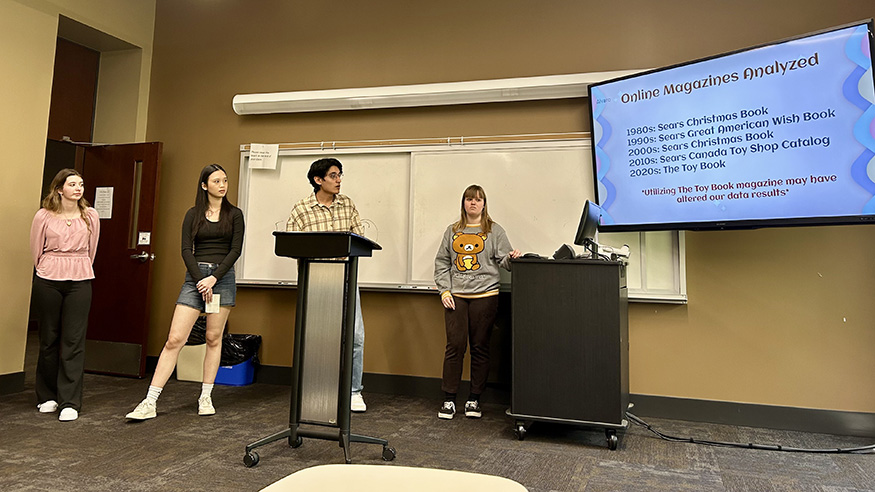
"50 Years of Boys and Girls in Toy Advertisements"
Presented by Karolina Rapa '27, Riley Vu '27, Bao Tran '27, Alvaro Zamudio '28 and Natalie Perra '27
"50 Years of Boys and Girls in Toy Advertisements" is a communication studies research project presented by Karolina Rapa, Riley Vu, Bao Tran, Alvaro Zamudio and Natalie Perra under the guidance of Dr. David Snowball. The team examined 250 toy advertisements from 1980 to 2020 to explore how gender roles are communicated through marketing. Using a detailed coding system, they analyzed toy traits, role behaviors and emotional expressions.
Their findings reveal that while some progress has been made, toy ads still largely reinforce traditional gender stereotypes by consistently showing girls as caregivers through domestic-themed toys like kitchen sets and boys in powerful or professional roles with action-packed sports gear.
Although recent advertisements show slight movement toward gender neutrality, the team emphasized that these changes are not yet significant. Their research invites viewers to reflect on how these early marketing messages shape the identities, aspirations and futures of children, teens and families.
How to protect communities in Tornado Alley
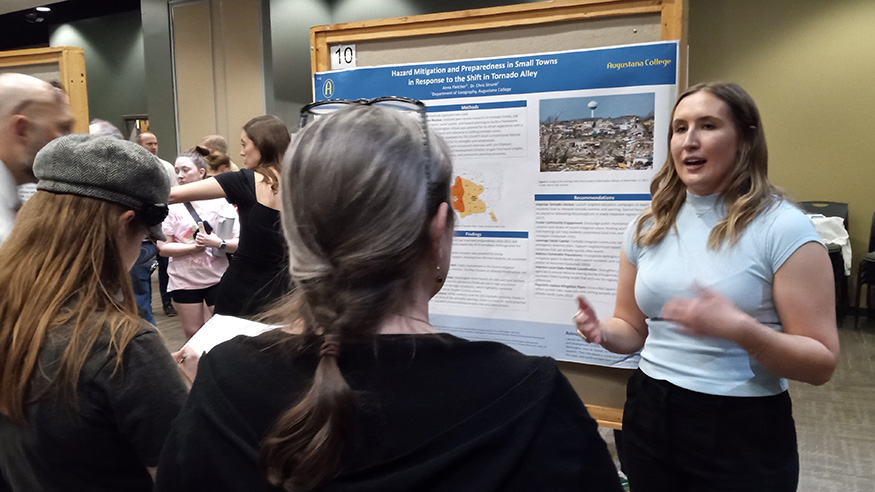
"An Examination of Hazard Mitigation and Preparedness in Small Towns in Response to the Shift in Tornado Alley"
Presented by Anna Fletcher ’25, geography
Tornado Alley in the United States is shifting to the east, putting more towns, unsuspecting towns, at greater risk.
Anna Fletcher ’25 presented her research on how small towns, particularly Washington, Ill., are responding to this change by taking action to become more prepared to reduce/eliminate risks to life and property from tornadoes. Washington was hit hard by an EF-4 tornado in 2013.
“My biggest finding was that Washington shows strong social capital [trusted relationships] and community resilience after the 2013 tornado,” Fletcher said. “But its formal mitigation efforts still lack a little bit in terms of addressing vulnerable populations and involving community engagement in the formation of the plan.”
Fletcher’s study highlights disparities in federal disaster aid allocation, reflecting a need for revised policies that include regional differences in population and infrastructure. A key finding showed that tornado literacy among Washington residents contributed to a low fatality rate during the 2013 disaster, showing the importance of public education initiatives.
Her recommendations for towns now considered to be in Tornado Alley?
“Increase tornado risk literacy through targeted education, involve social capital in official mitigation plans and involve residents in the planning process,” she said.
Fletcher’s project advisor was Dr. Christopher Strunk, chair and associate professor of geography.
The future of AI in museums
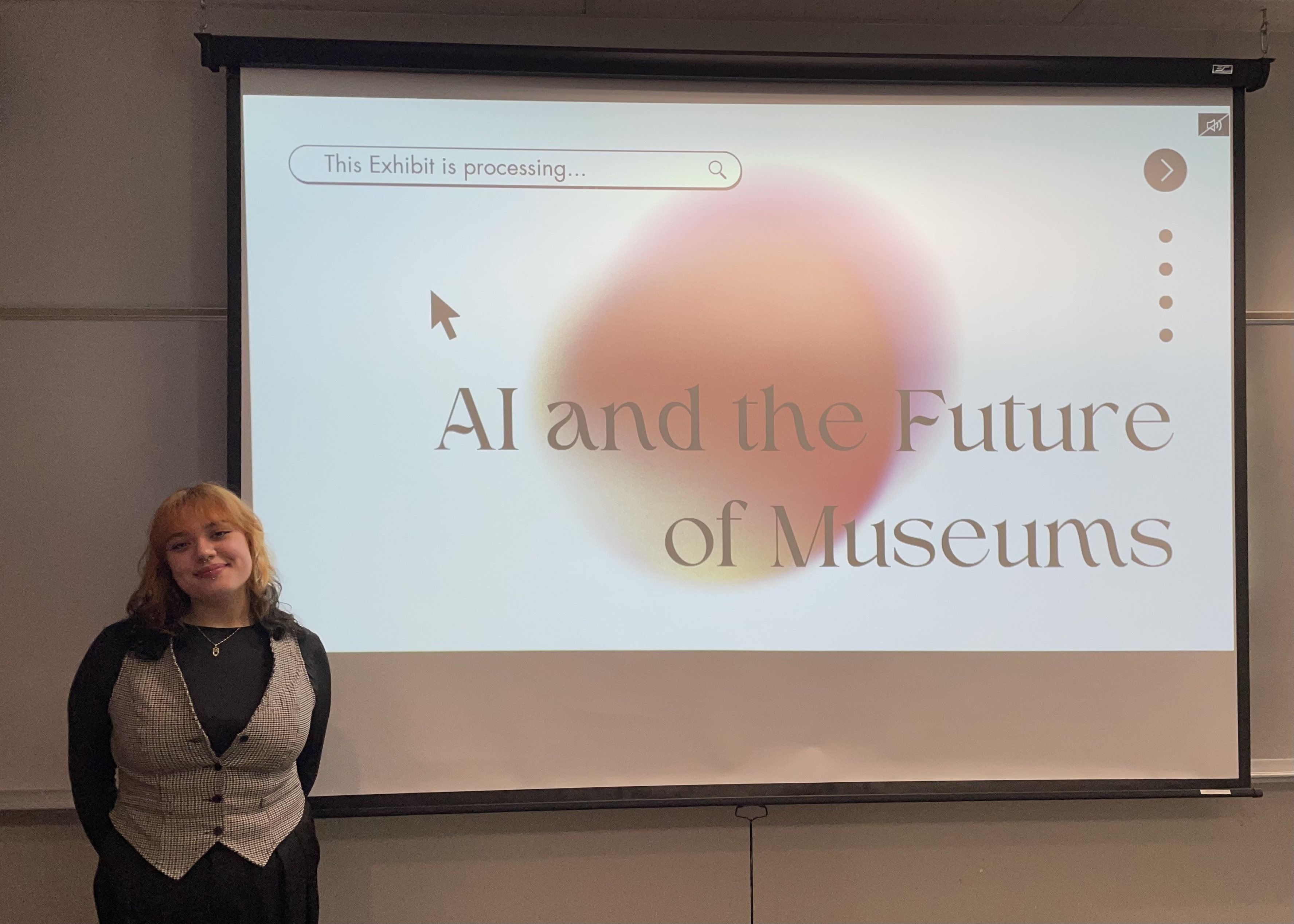
“This Exhibit is Processing… AI and the Future of Museums”
Presented by Cami Flores ’25, computer science and sociology
Cami Flores ’25 blended her majors for her senior capstone in sociology. In her presentation, Flores explored how artificial intelligence (AI) is reshaping curatorial practices, public engagement and the ethical landscape of cultural institutions.
While AI has the potential to make museums more accessible and inclusive, Flores noted that its use also raises significant concerns around privacy, environmental impact, bias and questions of authorship.
“Museums are experimenting with things like machine learning, algorithms and even generative tools to enhance exhibits, personalize tours and digitize their collections,” she said. “These systems don’t just help tell stories; they influence which stories get told. That’s a major change in curatorial power, and it raises serious questions about bias, equity and control.”
How can museums move forward responsibly?
“Museums shouldn’t just teach with AI; they should teach about AI,” she said. “Visitors need to understand how these systems work, who builds them and what their limitations are.” She also stressed the need for decolonized data practices and community collaboration that includes indigenous advisors and artists in curation.
“Museums have always shaped memory,” Flores said. “Now, with AI, they shape how memory is processed, archived and shared. This future is not predetermined. It’s a choice. A choice about inclusion, authorship and the kind of world we want to build.”
Flores’ project advisor was Dr. Adam Kaul, professor of anthropology.


